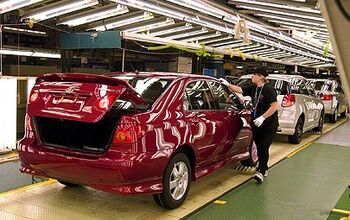Toyota Plants In Canada On The Path To Organizing
The UAW’s troubles with organizing Volkswagen’s Chattanooga plants are well known throughout the auto world, but Unifor, the Canada union that was once known as the Canadian Auto Workers union, now claims that it has enough union cards to hold a vote on representation.
Speaking to the Windsor Star, Unifor president Jerry Dias claims that 3,200 of Toyota’s 6,500 employees at plants in Cambridge and Woodstock have signed the cards, but Unifor will delay a vote until it is confident it can win a “comfortable majority”.
According to Dias, money isn’t the primary issue for the desire to organize, and workers are confident that the backlash from unionizing will be minimal
“We’ve had other organizing drives in the past, but this one is by far the most successful..the workers are getting older. The issues aren’t so much wages. It’s line speed and the company unilaterally imposing changes to shifts and pension plans that have infuriated people…they used to be afraid that the plant would close. They see that’s not true. Toyota built more than 500,000 cars in Canada last year. They’re not going anywhere.”
Dias reported that 85 percent of Toyota plants worldwide are unionized, and that Unifor is expecting minimal interference from the company. Having just returned from meetings with Japanese union leaders in Tokyo, Dias said that Japanese unions will ask Toyota officials not to have Canadian management interfere with the organizing drive.
This isn’t the first time the CAW/Unifor has tried to organize Toyota plants, or other transplants for that matter. The former CAW made a lot of noise about organizing Honda’s Alliston, Ontario plant, and has been at it since the 1990’s but nothing has panned out to this day.
While Dias asserts that the majority of Toyota plants are unionized, one key detail not mentioned is the differing nature of unions in North America and a place like Japan. Japanese labor unions are far less adversarial in their relationship with the company than an entity like the CAW/Unifor. The harmonious relationship is essential to the Japanese outlook on labor and business. During our research into the Honda-CAW matter, one former Honda employee with labor relations expertise told TTAC that organizing
“…runs counter to the Japanese concept of loyalty. The whole idea is that if you’re loyal to the company, they’ll look out for you and your best interests….Honda also doesn’t want an outside force interfering in the way their plants are run….[Organizing] interferes with the management structure of the plant itself – which is unacceptable to them.”
More by Derek Kreindler
Latest Car Reviews
Read moreLatest Product Reviews
Read moreRecent Comments
- ToolGuy TG likes price reductions.
- ToolGuy I could go for a Mustang with a Subaru powertrain. (Maybe some additional ground clearance.)
- ToolGuy Does Tim Healey care about TTAC? 😉
- ToolGuy I am slashing my food budget by 1%.
- ToolGuy TG grows skeptical about his government protecting him from bad decisions.


































Comments
Join the conversation
In Honda's case, if HCM unionizes, all production moves to Mexico. That's the way they roll!
RISESTAR ...assuming you really do work at the assembly plant being organized... ...you I will listen to. Thanks for chiming in. Question: Why can't more employees of the plants being organized offer up their viewpoints? And... Why can't employees at more North American plants begin to see things a bit more like the workers at Japanese plants seem to see and understand things? Is it really only in Japan that being confrontational... All the time... Is considered childish and unbecoming? I and many like me want to hear more... Hopefully from both line workers and members of management in the North American plants who have a more "Demming-like" perspective. If the Demming Award is the yearly Nobel Prize in Japan for enlightened thinking in the industrial world: Why can't ... No... Better yet: when ... Yeah that's it: ...when...will North American thinking become a bit less adversarial and a bit more Demming-Like? If "they " can do it... Surely we can too.